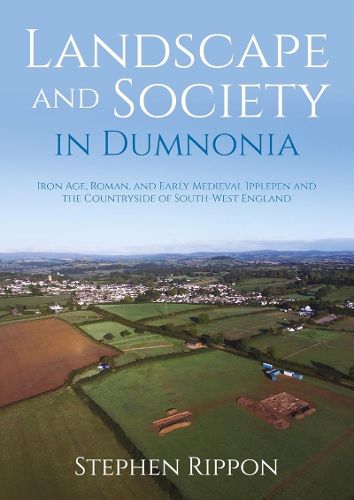Readings Newsletter
Become a Readings Member to make your shopping experience even easier.
Sign in or sign up for free!
You’re not far away from qualifying for FREE standard shipping within Australia
You’ve qualified for FREE standard shipping within Australia
The cart is loading…






This book explores the distinctive landscape and society of South-West England that had emerged by the Iron Age and which continued to develop during the Roman and medieval periods. A focus of the research was the long-term programme of survey and excavation on the Iron Age, Roman, and early medieval settlement at Dainton Elms Cross, in Ipplepen (Devon), which included the only Roman roadside settlement to have seen extensive excavation to the south and west of Exeter on the very edge of the Roman empire, as well as a substantial early medieval cemetery. First discovered through the reporting of an unusual concentration of Roman finds to the Portable Antiquities Scheme, the site was investigated through a joint university and community project led by the University of Exeter in partnership with the British Museum/PAS, Devon County Council, and Cotswold Archaeology. What for the South-West of England was exceptional preservation meant that large amounts of animal bone, charred cereals, and human remains were preserved, alongside a regionally important material culture assemblage. The site ? which had been occupied for c. 1200 years ? was abandoned around the 8th century AD. A programme of documentary, place-name, and historic landscape research across a study area extending from the coast up onto Dartmoor explores the context of this major landscape change, which appears to have been associated with the appearance of hamlets and open fields, and the fragmentation of an 'early folk territory'. Together, the excavations in Ipplepen and the wider contextual research reveal how communities living in South-West England developed a distinctive identity that reflects a well-developed understanding of their region's natural environment alongside a degree of ambivalence to outside cultural influences. AUTHOR: Stephen Rippon is Professor of Landscape Archaeology at the University of Exeter. His current research interests cover the landscapes of Roman and medieval Britain, with a particular focus on the origins and development of regional variation in landscape character.
$9.00 standard shipping within Australia
FREE standard shipping within Australia for orders over $100.00
Express & International shipping calculated at checkout
This book explores the distinctive landscape and society of South-West England that had emerged by the Iron Age and which continued to develop during the Roman and medieval periods. A focus of the research was the long-term programme of survey and excavation on the Iron Age, Roman, and early medieval settlement at Dainton Elms Cross, in Ipplepen (Devon), which included the only Roman roadside settlement to have seen extensive excavation to the south and west of Exeter on the very edge of the Roman empire, as well as a substantial early medieval cemetery. First discovered through the reporting of an unusual concentration of Roman finds to the Portable Antiquities Scheme, the site was investigated through a joint university and community project led by the University of Exeter in partnership with the British Museum/PAS, Devon County Council, and Cotswold Archaeology. What for the South-West of England was exceptional preservation meant that large amounts of animal bone, charred cereals, and human remains were preserved, alongside a regionally important material culture assemblage. The site ? which had been occupied for c. 1200 years ? was abandoned around the 8th century AD. A programme of documentary, place-name, and historic landscape research across a study area extending from the coast up onto Dartmoor explores the context of this major landscape change, which appears to have been associated with the appearance of hamlets and open fields, and the fragmentation of an 'early folk territory'. Together, the excavations in Ipplepen and the wider contextual research reveal how communities living in South-West England developed a distinctive identity that reflects a well-developed understanding of their region's natural environment alongside a degree of ambivalence to outside cultural influences. AUTHOR: Stephen Rippon is Professor of Landscape Archaeology at the University of Exeter. His current research interests cover the landscapes of Roman and medieval Britain, with a particular focus on the origins and development of regional variation in landscape character.